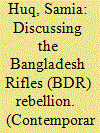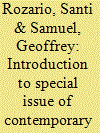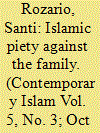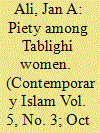|
|
|
Sort Order |
|
|
|
Items / Page
|
|
|
|
|
|
|
| Srl | Item |
| 1 |
ID:
106697


|
|
|
|
|
| Publication |
2011.
|
| Summary/Abstract |
This article explores the piety/politics nexus by asking what it means when educated, urban Bangladeshi women who are embracing religion anew claim that their pursuit of piety, and the learning circles that inspire it, are apolitical. I explain this self-proclaimed apolitical stance through women's own accounts of why and how they maintain political neutrality. The article demonstrates that organizers of many Islamic discussion circles in Dhaka consciously strive to attain a certain political neutrality, while allowing whoever is interested to attend, irrespective of the latter's political affinities. This decision stems from an understanding of the lack of trust that accompanies organized religion in Bangladesh, and its alliance, in the national imaginary, with the explicit political agenda of the Jama'at-i Islami. The article provides an account of different discussion circle members' varied articulation of political neutrality and how they draw from different ideas and discourses about being publicly religious in their molding of the ideal, pious, Bangladeshi woman. To exemplify the pious self-fashioning of urban, educated, Bangladeshi women, I will recount the ways in which several women discussed the March 2009 Bangladesh Rifles mutiny-a highly politically charged event. Women's accounts of the mutiny serve to unify lesson attendees around the cultivation of piety. Contestations over national politics and political affinities are made secondary, as women focus on giving an ethical bend to the deeply personal, subjective and gendered experiences of being educated and upwardly-mobile in present day urban Bangladesh.
|
|
|
|
|
|
|
|
|
|
|
|
|
|
|
|
| 2 |
ID:
106693


|
|
|
| 3 |
ID:
106699


|
|
|
|
|
| Publication |
2011.
|
| Summary/Abstract |
One might suppose that a foundational element of proper Muslim behaviour is respect for one's parents. However, it is not unusual in the contemporary Islamic world, both in Muslim-majority countries and in the diaspora, for young people to be much more 'Islamic' in behaviour, dress and lifestyle than their parents. As this may suggest, modernist Islamic piety is not infrequently directed by young people against their parents, as a mode of resistance to parental authority. However, wearing the hijab, becoming a follower of a Sufi shaykh, or marrying a 'good' Muslim spouse from another ethnic group to one's own, are different kinds of resistance from, for example, joining an inner-city youth gang, or rejecting one's parents' Asian cultural background for a more globalised identity. I discuss some of the ways in which Islamic piety can be deployed in resistance to parental authority through case studies from my Economic and Social Research Council-funded field research in Bangladesh and the UK, and consider in what ways these forms of behaviour resemble, and differ from, more familiar forms of resistance.
|
|
|
|
|
|
|
|
|
|
|
|
|
|
|
|
| 4 |
ID:
106700


|
|
|
|
|
| Publication |
2011.
|
| Summary/Abstract |
Barbara Metcalf suggested some years ago that a well-known contemporary Islamic movement of pietist inclinations, the Tabligh-i Jama'at, acted in effect to produce a gentler, more feminised male Muslim identity among its adherents. Some other contemporary Islamic movements have similar tendencies. Ritual practices among the Hijaz Community, a mostly Pakistani organisation in the British Midlands, for example, are explicitly aimed to produce a gentler, less aggressive orientation among their followers. Can we see these new movements as part of the evolution of new forms of masculinity among Muslim men, both in Muslim-majority and diasporic populations? I explore this question through field research carried out as part of an ESRC-funded research project on young Muslims in the UK and Bangladesh.
|
|
|
|
|
|
|
|
|
|
|
|
|
|
|
|
| 5 |
ID:
106694


|
|
|
|
|
| Publication |
2011.
|
| Summary/Abstract |
Islamic piety in Muslim women has been on the rise in the last three decades around the world. Much of it involves formerly nominal Muslim women becoming observant of Islamic rules, rituals and practices and taking their faith seriously. For these women, it is a journey of spiritual elevation. It is a new endeavour of Islamic awakening and self discovery. All this is occurring in an era characterized by a modernity which claims, among other things, that religion is the basis for women's oppression in society. Thus, western and western-educated scholars and feminist theorists have argued for the "unveiling" of Muslim women as part of the process of weakening the hold of Islam and allowing women to become free thinking, liberal and independent. This article is an attempt to explore the continuous growth of Islamic piety in Muslim women around the world. Using the Tabligh Jama'at in Australia as a case study, the article seeks to understand the role of Islamic piety in Muslim women. The article argues that Islamic piety in Muslim women is an attempt by Muslim women to find a religious response to modernity.
|
|
|
|
|
|
|
|
|
|
|
|
|
|
|
|
| 6 |
ID:
106696


|
|
|
|
|
| Publication |
2011.
|
| Summary/Abstract |
In this article, I address piety as a concept shaping Muslim women's online discussions about gender roles, marriage and professional careers. I also investigate cross-cultural religious encounters in these women-only groups as I am interested in the potential of such online environments to facilitate women's religious reflection and intellectual engagement. Finally, I explore motivations and religious interpretations of three categories of participants in these discussions: egalitarians, for whom gender equality is a necessary component of piety (Barlas 2006); traditionalists, identified by other authors as Islamists (Karam 1998) or social conservatives (Gül and Gül 48:1-26, 2000; Mahmood 2005) and finally, holists, a group that cannot be mapped out on the political landscape by using the progressive-conservative binary (Badran, Agenda 50:41-57, 2001) and which exists and acts outside of it, neither subverting nor enacting norms of any dominant system, be it secular-liberal or patriarchal. Following Mahmood's argument that formulating an analysis based exclusively on such a binary is simplistic (Mahmood 2005), I argue that actions of holists can be only addressed by formulating a set of questions different to those used to analyse self-defined egalitarians or traditionalists.
|
|
|
|
|
|
|
|
|
|
|
|
|
|
|
|
|
|
|
|
|